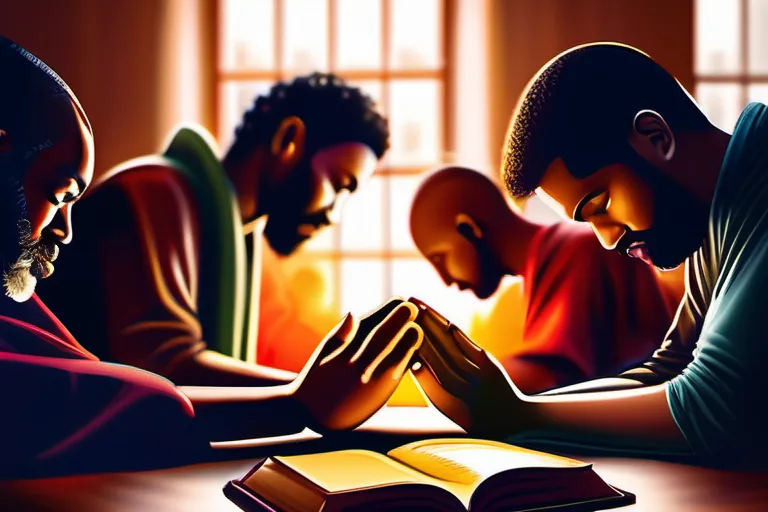Explore the fundamental beliefs, practices, and doctrines of the Born-Again Christian religion in this detailed guide.
This article delves into the core beliefs that define the Born-Again Christian faith. From salvation through Jesus Christ to the importance of the Holy Spirit, we’ll explore the key tenets that shape this vibrant and growing movement.
The Role of Jesus Christ in Born-Again Christianity
The role of Jesus Christ in Born-Again Christianity is as central and profound as the heart is to the human body. Imagine if, in your life, there was a figure who not only walked alongside you but also offered salvation from within; that’s what Born-Again Christians believe about Jesus.
For them, Jesus Christ is more than just a historical figure—He is the promised Messiah, the Savior of humanity. The idea that He came to earth, lived an exemplary life, and was crucified for our sins, then resurrected on the third day, is not just a story but a lifeline for many.
How can one grasp such a profound concept? It’s like trying to fathom the vastness of the ocean with a drop of water. Just as every wave in the ocean contributes to its depth and beauty, each moment of Jesus’ life—His teachings, His miracles, and especially His sacrifice—adds layers to our understanding of Him.
But why is His resurrection so significant? It’s akin to finding the key that unlocks a door you never thought would be accessible. For Born-Again Christians, it means more than just a historical event; it’s a guarantee that Jesus has power over death and life. This belief isn’t just about the past; it shapes their present and future.
Consider this: if we see Jesus as merely a great teacher or a good example to follow, do His teachings hold the same weight? But when we understand Him as the Savior, everything changes. It’s like discovering that the sun not only provides light but also warmth and life itself.
In essence, Born-Again Christianity is built on the belief that through faith in Jesus Christ, individuals can experience a transformation from death to life, from darkness to light. This faith isn’t just about believing; it’s about living a new life, a life of hope, love, and purpose—thanks to the central role that Jesus Christ plays in their beliefs and practices.
Can you imagine what your life would be like if you had someone guiding you not only through the storms but also offering eternal companionship? That’s the promise Born-Again Christians see in Jesus. He is not just a distant figure from history; He is present, active, and deeply involved in their lives.
How do these beliefs shape your understanding of God’s love for humanity? Is there a way to integrate such profound faith into daily living?
The Importance of Salvation in Born-Again Christianity
Imagine you’re walking through a dense forest, and suddenly you realize you’re lost. The path ahead is unclear, and the trees seem to close in around you. In this moment, salvation becomes your beacon, shining a light on the way out. For Born-Again Christians, salvation isn’t just about finding an exit; it’s a journey of transforming from darkness into light.
So, what exactly does ‘salvation’ mean in this context? It’s not merely about escaping the physical world but more importantly, it means being saved from the bondage of sin and death. In the eyes of Born-Again Christians, salvation is a divine rescue operation orchestrated by God Himself, with Jesus Christ as the central figure.
The idea that one can be saved through faith in Jesus Christ isn’t just a belief—it’s a transformational act of grace. How does this happen? It starts with recognizing your need for it, much like realizing you’re lost and admitting you need help to find the way back home. For Born-Again Christians, this recognition comes as a result of seeing their sins and understanding that they cannot save themselves.
Once that realization hits, there’s an invitation to accept Jesus Christ into your life. It’s like reaching out for a hand in the darkness; you grasp it, and suddenly, you’re no longer alone. This moment of acceptance is often referred to as “being born again,” a phrase that underscores this new beginning—a change from the old self to a new one.
The process isn’t just about accepting Christ but also embracing the teachings found in the Bible. It’s like planting a seed and nurturing it until it grows into a tree of life. Faith, hope, and love—these are the fruits that grow when you truly embrace salvation through Jesus Christ.
But why is this so important? Because without understanding and accepting salvation, one remains in the grip of sin and its consequences. It’s like being trapped in a labyrinth with no exit; only by finding the key to unlock the door can you break free. For Born-Again Christians, salvation opens the gates of heaven, promising eternal life and peace.
In summary, for those walking through the forest of life, salvation is not just a destination but a journey of discovery and transformation. It’s about finding the light, accepting help, and stepping into new beginnings. This chapter has only scratched the surface; in the next part, we’ll explore how this salvation continues to shape one’s life through the guidance of the Holy Spirit.
The Holy Spirit in Born-Again Christianity
Understanding the role of the Holy Spirit in Born-Again Christianity is like exploring a map that guides us through life’s most profound experiences. Have you ever wondered how the Holy Spirit, described in the New Testament as ‘the Spirit of truth’, shapes and transforms the lives of believers? The Holy Spirit plays an essential part in the conversion experience, much like a key unlocking a door to new possibilities.
At the moment of conversion, when a Born-Again Christian accepts Jesus Christ into their heart, it is believed that the Holy Spirit makes a presence. This is often referred to as ‘the baptism of the Holy Spirit.’ It’s not just about entering a church; it’s about being enveloped by something greater, like stepping into a vast ocean and feeling its immense power surround you. The Holy Spirit confirms our faith in Jesus Christ, assuring us that we are saved (Romans 8:16).
But the role of the Holy Spirit doesn’t end at conversion; it continues to be active throughout a believer’s life. Think of the Holy Spirit as a steady wind guiding a ship through stormy seas. Just as the Bible teaches, the Holy Spirit helps us understand God’s will and guides our decisions (John 16:13). This ongoing presence can manifest in various ways – through personal insights, comfort during trials, or even miraculous healings.
The work of the Holy Spirit is also crucial in equipping believers for ministry. The Apostle Paul speaks of receiving gifts from the Holy Spirit that enable us to serve others effectively (1 Corinthians 12:7-11). Whether it’s preaching, teaching, or showing compassion, these gifts empower us to share Christ’s love with the world.
Moreover, the Holy Spirit is involved in the process of sanctification – the gradual transformation of a believer into the image of Christ. It’s like a gardener gently shaping a plant over time; through prayer, worship, and obedience, the Holy Spirit molds us into becoming more like Jesus (2 Corinthians 3:18).
In summary, the Holy Spirit is not just an occasional visitor but a constant companion in the journey of faith. Understanding His role helps us appreciate why Born-Again Christians view Him as essential for their spiritual growth and walk with Christ.
The Bible in Born-Again Christianity
The Bible stands as the cornerstone of Born-Again Christianity, much like the foundation of a grand cathedral supports its towering spires and intricate stained-glass windows. In fact, the term ‘Bible’ itself comes from Greek words meaning ‘the books,’ reflecting its collection of sacred texts that guide believers’ lives.
Authority and Inspiration: For Born-Again Christians, the Bible is not just a book but a living, breathing entity that speaks directly to their souls. How can we not ask ourselves, “Who wrote this scripture, anyway?” The belief in divine inspiration holds that each word was guided by the Holy Spirit, making it infallible and authoritative. This authority extends beyond mere human writing; it’s seen as a direct line from God to humanity.
Worship and Devotion: During worship services, the reading of scriptures is akin to opening the front door of your spiritual home—welcoming in visitors with open arms. These readings are not just recitations but profound moments where the divine word resonates within the hearts and minds of the congregation. They serve as reminders of God’s love and a call to live virtuously.
Study and Daily Life: Outside of formal worship, the Bible is a constant companion in daily life. It’s like having a personal coach who offers guidance through each chapter. Christians use it for daily devotions, seeking wisdom and comfort in its pages. Through study and reflection, they uncover new insights and find ways to apply its teachings to modern challenges.
Interpretation and Application: However, interpreting the Bible can be as complex as deciphering an ancient script. Born-Again Christians believe that the Holy Spirit helps them understand these texts better, guiding them in how to apply biblical principles to their lives. This process is akin to finding a hidden path through a dense forest—sometimes clear and other times requiring careful navigation.
In essence, the Bible is not just read but lived. It’s woven into the fabric of Born-Again Christianity, shaping beliefs, behaviors, and relationships. By embracing its teachings, believers seek to align their lives more closely with God’s will, much like following a map to reach a distant yet meaningful destination.
Prayer in Born-Again Christianity
Prayer is like the heartbeat of Born-Again Christianity, echoing through the lives of believers as they seek to connect with their God. How does this practice shape the spiritual journey of a Born-Again Christian? And what role does prayer play in their faith?
In many ways, prayer serves as the bridge between heaven and earth. It’s not just about asking for things; it’s about building a relationship with God. Consider the example of Jesus praying in the garden before his crucifixion—his prayers were both moments of intense communion with the Father and pleas for strength during difficult times.
Born-Again Christians believe that prayer is a two-way street, where they can receive guidance from God as well as express their thoughts and concerns. The practice encompasses various methods, from silent contemplation to public worship in church services. Each method serves a unique purpose, fostering deeper intimacy with the divine.
The belief in answered prayers is deeply rooted in scripture, with numerous examples of prayer being instrumental in changing circumstances (think of Daniel in the lion’s den or Elijah’s intercessory prayer). This conviction encourages believers to persistently ask and seek, knowing that their faith can move mountains.
Moreover, prayer is integral to daily life. It provides a means for expressing gratitude, seeking forgiveness, and finding comfort in times of trial. In fact, many Born-Again Christians start and end their day with prayers, weaving this spiritual practice seamlessly into the fabric of their existence.
So, what’s your experience with prayer? Do you find it transformative? How does praying for others impact your faith journey?
Remember, prayer is not just a ritual but a profound expression of trust and love. It’s an opportunity to connect with the infinite and eternal, making every word matter in the grand tapestry of your spiritual life.
The Role of the Church in Born-Again Christianity
The church in Born-Again Christianity serves as more than just a physical building; it’s like a bustling garden where every member is a unique flower, each with its own color and fragrance. But what exactly does this vibrant community do for its members? How does it shape their lives?
At the core of its purpose, the church acts as a pillar of support, providing spiritual sustenance through weekly services. These gatherings are not merely about listening to sermons; they’re opportunities for believers to connect with the divine and with one another. Imagine a vast tapestry woven together by the threads of faith—each member contributing their unique pattern, creating something beautiful and resilient.
The structure of the church is both hierarchical and inclusive. It’s like a tree with deep roots and sprawling branches, where leaders guide and nurture the community while ensuring everyone feels valued and heard. Elders and pastors play crucial roles in leading, teaching, and offering pastoral care. Yet, the essence lies in the unity and mutual respect among all members.
The importance of fellowship cannot be overstated. It’s a light in darkness, bringing warmth and companionship to believers’ lives. Regular activities like Bible studies, small group meetings, and social events help maintain this sense of community. Through these interactions, Born-Again Christians find strength in numbers, support during tough times, and joy in shared experiences.
In essence, the church is a spiritual lifeline, offering more than just religious teachings; it provides a network of care, encouragement, and love that sustains believers through life’s challenges. It’s not just about attending services but living a life deeply connected to one another and to God.
So, how does your local church contribute to your spiritual journey? Are you actively involved in its ministries and community activities?
Conclusion
 By understanding these core beliefs, you’ll gain a deeper appreciation for the Born-Again Christian religion and its impact on millions worldwide. Let this guide serve as your starting point to further exploration and spiritual growth.
By understanding these core beliefs, you’ll gain a deeper appreciation for the Born-Again Christian religion and its impact on millions worldwide. Let this guide serve as your starting point to further exploration and spiritual growth.











